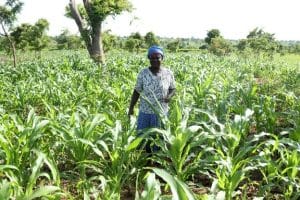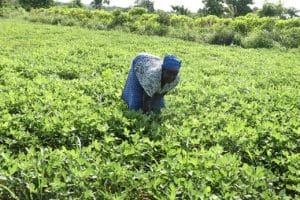
In the vibrant village of Kotoya, the sun rose to the sweet melodies of chirping birds, filling the air with a symphony of nature. Amidst these harmonious melodies, a determined group of farmers, including the resilient widow and mother of seven, Pobidan Naamo, embarked on their usual journeys to their farms.
Pobidan, a member of the 4R co-operative, had witnessed the incredible advantages that awaited those who embraced innovative 4R farming practices. Inspired by the success stories shared during field days conducted by the 4R Nutrient Stewardship Project, she decided to explore new possibilities. In 2021, her co-operative established a groundnut demonstration farm, venturing into the “novel” territory of planting in rows and applying fertilizers.
As the crops matured, it became evident that both the fertilized and unfertilized fields outperformed the traditional farming methods employed by the community, which was scattered planting. Intrigued by these promising results, Pobidan took a leap of faith in 2022, adopting the practice of planting her maize field in rows, meticulously guided by a garden line. Despite financial constraints that prevented her from applying fertilizers, her yields surpassed those of her colleagues who adhered to conventional methods.
As I immersed myself in the enchanting melodies of the birds that filled the air, my steps led me to Pobidan’s farm while visiting other farmer fields. There, amidst the vibrant greenery, I found her diligently inspecting the weeds and carefully uprooting them. Intrigued by her dedication and the thriving crops around her, I approached her with a warm greeting, and our conversation began.
Officer: Good morning, Pobidan! I can see some of the farmers around you have planted their crops in the usual way, randomly. But you’ve chosen to plant yours in neat rows. Why did you decide to do things differently?
Pobidan: Ah, good morning, sir! Well, I have seen the advantages of planting in rows and applying fertilizers. Just take a look at my field. See how green and strong the plants look?
 Officer: That’s impressive! But is this your first year adopting these practices?
Officer: That’s impressive! But is this your first year adopting these practices?
Pobidan: Oh no, sir. Last year, I cultivated maize using the row planting method. Despite the drought that affected all of us, my yields were quite impressive compared to some of my colleagues.
Officer: Interesting! Why do you think your yields were better?
Pobidan: It’s because I planted in rows. This made weeding much easier for me. You’d feel guilty if you left your farm filled with weeds. It demands you to keep it neat. Even my son, who helps me with spraying, found it much easier to navigate around the field.
Officer: I see. So what crops are you cultivating this year?
Pobidan: This year, I am cultivating maize, groundnut, and tiger nut. I’ve planted both maize and groundnut in neat rows, and I’m making sure to keep my farm clean. That’s why I come here every day.
Officer: And what do you do with the yields you get from your farm?
Pobidan: Oh, sir, my children! I have a child in tertiary education, and their fees are quite expensive. I also have two children in senior high school and one in junior high school. So, I store my produce and sell it when I need money to support their education or any other needs we have.
Officer: That’s commendable. In general, how valuable do you think this project is for the farmers in your region?
Pobidan: Oh, sir, this project is helping us tremendously! Even if nothing else, the harvest can feed us until the following year. Imagine if we had the means to apply fertilizers; we would achieve even greater things in this community. This project is changing our lives, and we sincerely hope it continues for many more years. Our lives will be transformed, and Kotoya will no longer be just a village. We are so grateful for this support. Our eyes have truly been opened.
Officer: Thank you for sharing your story, Pobidan. It’s truly inspiring to see the positive impact this project has had on your life and the community. I wish you all the best with your farming endeavours.
Pobidan: Thank you, sir. Your kind words mean a lot to me. Have a wonderful day!
The collective efforts of the co-operative have led to a significant achievement – they are in the process of acquiring a grinding mill. This milestone would stand as a testament to the growing strength and unity within the community co-operative. Pobidan, filled with gratitude, extended her heartfelt appreciation to the project donors and the dedicated project team for the profound impact they had made on their lives.
The adoption of the 4R practices advocated by the co-operative was gaining momentum among farmers in the region, resulting in real socio-economic improvements. With the support of Canadians through Global Affairs Canada, the project has empowered over 34,000 smallholder farmers (17,557 women and 16,624 men) in Ghana, promising a brighter future for Kotoya. As the villagers envisioned a transformed landscape and an end to their village life, their gratitude reflected the hope that this support would continue, paving the way for a remarkable transformation.
With a warm farewell, the officer left Pobidan to nurture her flourishing fields, knowing that the seeds of change had been planted. A bountiful harvest awaited, not only in terms of crops but also in the hearts and minds of those whose lives had been forever changed by the 4R Nutrient Stewardship Project. Thanks to Global Affairs Canada, the Co-operative Development Foundation of Canada, Fertilizer Canada, African Plant Nutrient Institute (APNI) and other project collaborators for this intervention.